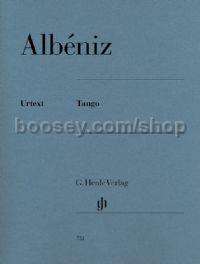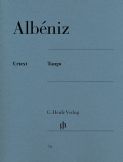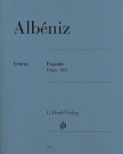Tango (Piano)
Tango (Piano)
* Estimated price converted from UK retail price
"If you're after single-edition copies of these works, look no further." - Pianist Magazine
“Señor Albéniz may well inscribe upon his escutcheon the words ‘Veni, vidi, vici’.” The London press thus commented on the Spaniard’s triumphal tour of Britain between 1889 and 1893. It was in the British Isles of all places that Albéniz increasingly turned to subjects from his native country, composing España (HN857) amongst other things. Although it might seem surprising, in this tribute to the Iberian peninsula Albéniz also included a tango that appears in the form of a Cuban habanera. Behind the multicultural charade is one of Albéniz’ most popular works, full of warm longing for exotic climes. This easy-to-play piece is now available as a single edition.
Fingering: Rolf Koenen
Preface
In a concert on 7 June 1890 in London’s Steinway Hall, Isaac Albéniz (1860– 1909) first publicly performed his España, from which the Tango of the present edition is taken. The cycle was published that same year, 1890, by the London publisher Pitt & Hatzfeld. Later Schott London acquired the rights to España, and during Albéniz’s lifetime published several issues of the print using the plates of the first edition. No manuscript sources survive.
Three sources have been consulted for the present edition: the first edition (London, Pitt & Hatzfeld, published 1890. Copy consulted: London, British Library, shelfmark g.848.a.[3.]) as well as two later editions (Schott, date of publication uncertain; copies consulted: no. 1, Öffentliche Bibliothek der Universität Basel, Musiksammlung, shelfmark kk XVIII 775; no. 2, Cambridge, University Library, shelfmark MRS. 8.334). The primary source for our edition of the Tango is the first edition.
The later editions serve as secondary sources: no. 1 merely adds accidentals that were missing in error from the first edition; the changes to no. 2 are more extensive and comprise added slurs and staccato dots, along with fingering indications. Since it cannot be ruled out that the additions of articulation marks derive from the composer, we have reproduced them in square brackets; fingerings are printed in italics. Additions placed in parentheses stem from the editor. For detailed information on the sources and on this edition, please consult the Comments in the complete volume España op. 165 from which the present single edition was taken.
Munich, spring 2013 - Norbert Müllemann







